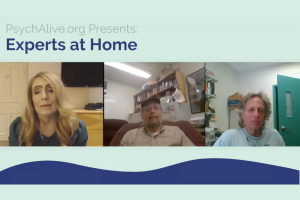How Writing Helped Me Survive My Son’s Suicide
 The day my son Paul died I couldn’t even put my underpants on right side out, and in the days that followed I had to retrain myself to do what I needed to do just to appear alive. I had to walk myself through the steps – get up, go to the bathroom, brush teeth, go into the closet, and pick out something to wear. It was as basic as that. I couldn’t stay focused on anything. I was always on the verge of tears. I had to keep reminding myself that he was really gone – that it was true, that I would never see my oldest son again, that I would never hear him play the piano again, and that I would never have another chance to have another conversation with him as I did the night before his death.
The day my son Paul died I couldn’t even put my underpants on right side out, and in the days that followed I had to retrain myself to do what I needed to do just to appear alive. I had to walk myself through the steps – get up, go to the bathroom, brush teeth, go into the closet, and pick out something to wear. It was as basic as that. I couldn’t stay focused on anything. I was always on the verge of tears. I had to keep reminding myself that he was really gone – that it was true, that I would never see my oldest son again, that I would never hear him play the piano again, and that I would never have another chance to have another conversation with him as I did the night before his death.
When my sister-in-law wrote in a recent email, “It doesn’t get any better, does it?” I had to answer, “No, it doesn’t.” But writing about his death and its aftermath and the steps I took to live a full and productive life after the worst tragedy that can happen to a mother and family helped ease the pain and enabled me to survive. Paul killed himself in our family home twelve years ago after a seven-year struggle with bipolar disorder. And in those twelve years I have learned to live with and survive this loss.
Early on a friend encouraged me to try traditional therapy, but after one visit I was convinced that a therapist who hadn’t lived through an experience like mine couldn’t begin to relate to me or help me. So, writing about my son’s bipolar disorder and death became my therapy. Writing in my journal became an obsession and a balm.
Writing was healing because it allowed me put my pain on the page. Instead of carrying it with me every moment of the day and night, I found a place where I could have a little relief. There was so much I couldn’t say out loud to anyone. I couldn’t even cry in front of my husband or he would think I was having a breakdown. And since there was so much anger and grief in me, I needed a place to put it.
Writing in those early days after Paul died was like repeating a mantra. I just kept moving my pen across the page. I wouldn’t let anything get in the way of my writing time. The page was always ready for my tears, my rants, my sorrow, my complaints, and my thoughts and ideas. The page never told me what to do or how to handle my grief. The page never told me it was time to stop grieving already. The page became my everyday friend – a special place I could go to empty my full heart.
For me just the act of writing is helpful – yes, after twelve years I still need to write. Early on I wrote with pen in hand in a journal notebook – the classier the paper the better – and I wrote until my hand cramped. Now I type, sometimes pounding my fingers on my computer’s keyboard. I find this works better for me because my typing fingers can keep up with the speed of the words in my brain. The faster my brain works the faster and harder my fingers press down. And I don’t stop until I’m finished, sometimes finding I’ve typed one thousand words in less than thirty minutes.
Little did I know at the outset that my journal entries, pieces written in the many writing workshops I’ve taken in the last twelve years, and poems would turn into my recently published memoir, Leaving the Hall Light On: A Mother’s Memoir of Living with Her Son’s Bipolar Disorder and Surviving His Suicide (Lucky Press, May 2011). Using my source documents helped me create a raw and honest book that offers parents and siblings who have experienced a child’s or a brother or sister’s death ways to get out of the deep dark hole they are in. Writing my story has also helped me keep my son Paul’s memory alive.










I emailed this to a friend who needs to discover a way to process her son’s suicide. Thank you for writing such a powerful message. Good luck with your journey.
I was more than touched about how you wrote about your therapeutic need to write after your son’s suicide. As a psychotherapist, my first response was that you went to the wrong therapist. But, then, as so often happens, when we allow a person to speak on, it became so clear that writing was – for you – the most meaningful and healing process to allow you to put one foot in front of another, one finger after another on a keyboard … and somehow survive and live beyond your family’s tragedy.
My memoir, FOUR ROOMS, UPSTAIRS: A Psychotherapist’s Journey Into and Beyond Her Mother’s Mental Illness is about to be re-published along with a book of essays.
(I only wish I had known about your publisher who sounds as wonderful as my first publisher(now gone belly-up, since my experience this time around has been quite painful. But enough about me. Your photo of you as well as the one of your family is warm and inviting; and your writing is wrenchingly clear, honest and will, no doubt, be helpful to many for years to come. Congratulations for your courage and sensitivity to a subject much needed to be shared. I hope that our paths cross one day. With gratitude and admiration, Linda Appleman Shapiro
I was more than touched about how you wrote about your therapeutic need to write after your son’s suicide. As a psychotherapist, my first response was that you went to the wrong therapist. But, then, as so often happens, when we allow a person to speak on, it became so clear that writing was – for you – the most meaningful and healing process to allow you to put one foot in front of another, one finger after another on a keyboard … and somehow survive and live beyond your family’s tragedy.
My memoir, FOUR ROOMS, UPSTAIRS: A Psychotherapist’s Journey Into and Beyond Her Mother’s Mental Illness is about to be re-published along with a book of essays.
I only wish I had known about your publisher who sounds as wonderful as my first publisher(now gone belly-up), since my experience this time around has been quite painful. But enough about me. The photo of you as well as the one of your family is warm and inviting. Your writing is wrenchingly clear, honest and will, no doubt, be helpful to many for years to come. Congratulations for your courage and sensitivity to a subject much needed to be shared. I hope that our paths cross one day. With gratitude and admiration, Linda Appleman Shapiro
2.Linda Appleman Shapiro Oct 09 2011 / 7pm
So touching……………..
Thanks for sharing…
Thank you all for your lovely comments and for coming over here to read my blog post. I look forward to being back here next month.
All best, Madeline
THANK YOU!! My sone committed suicide 8 weeks and 2 days ago – he suffered from depression and that led him to his death. We say “we undersatnd what you are going thru” – we hear “what can I do to help?” – and we give hugs hoping to make the pain better – but nothing helps – I came to this site looking for advice on how to gt thru the pain and accept the fact that he is not coming back although I keep feeling like he is just away from home for a while – it is hard to talk to others because it only upsets them and makes them worry more – writting is becoming my therapy so thank you for that.
Dear Monica,
I’m so sorry for the loss of your son. I too kept thinking my son would come back – that’s the reason for the title of my book, Leaving the Hall Light On – magical thinking that he’d be back and would need the light.
I’m glad you found writing. It was/is my savior.
I also wrote a piece here about comforting during times of grief. Did you also see that? Most people who haven’t been through what we have just don’t know what to do or say.
Please feel free to contract me by email. [email protected]
I wish you all the best and an easy holiday, as hard as I know it will be without your son. xoxo Madeline
I just came across this on a google search, I was hoping to find coping skills, it’s 2yrs on July 23rd since my beautiful eldest child and son commit suicide and my world is spinning, i think this is worth me trying, honestly anything is worth tying, I feel like half of me died that day and other half of me lives purely for my other son. I’m existing not living.